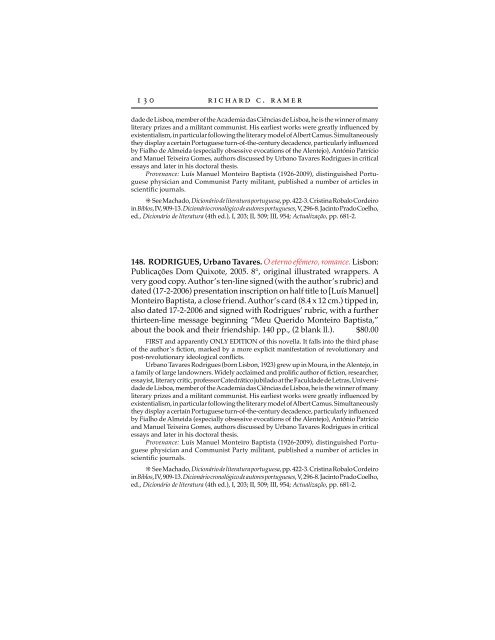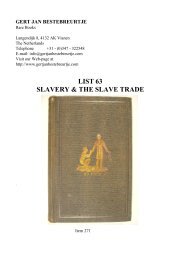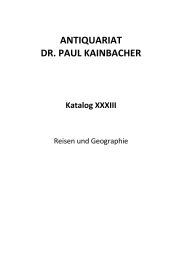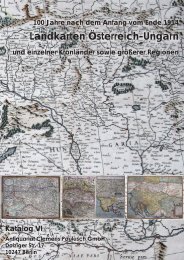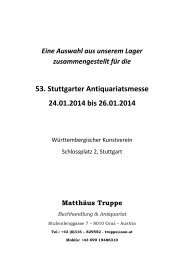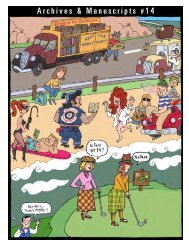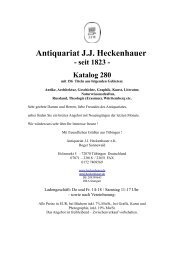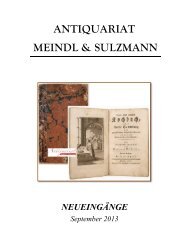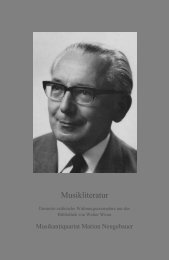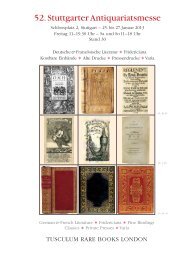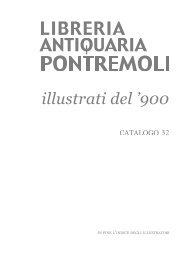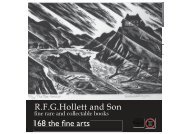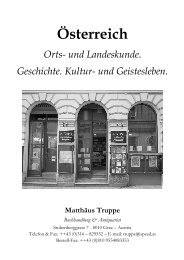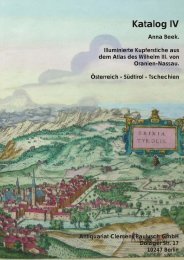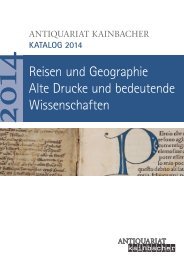Recent Acquisitions - Richard C. Ramer Old & Rare Books
Recent Acquisitions - Richard C. Ramer Old & Rare Books
Recent Acquisitions - Richard C. Ramer Old & Rare Books
You also want an ePaper? Increase the reach of your titles
YUMPU automatically turns print PDFs into web optimized ePapers that Google loves.
130<br />
richard c. ramer<br />
dade de Lisboa, member of the Academia das Ciências de Lisboa, he is the winner of many<br />
literary prizes and a militant communist. His earliest works were greatly influenced by<br />
existentialism, in particular following the literary model of Albert Camus. Simultaneously<br />
they display a certain Portuguese turn-of-the-century decadence, particularly influenced<br />
by Fialho de Almeida (especially obsessive evocations of the Alentejo), António Patrício<br />
and Manuel Teixeira Gomes, authors discussed by Urbano Tavares Rodrigues in critical<br />
essays and later in his doctoral thesis.<br />
Provenance: Luís Manuel Monteiro Baptista (1926-2009), distinguished Portuguese<br />
physician and Communist Party militant, published a number of articles in<br />
scientific journals.<br />
j See Machado, Dicionário de literatura portuguesa, pp. 422-3. Cristina Robalo Cordeiro<br />
in Biblos, IV, 909-13. Dicionário cronológico de autores portugueses, V, 296-8. Jacinto Prado Coelho,<br />
ed., Dicionário de literatura (4th ed.), I, 203; II, 509; III, 954; Actualização, pp. 681-2.<br />
148. RODRIGUES, Urbano Tavares. O eterno efémero, romance. Lisbon:<br />
Publicações Dom Quixote, 2005. 8°, original illustrated wrappers. A<br />
very good copy. Author’s ten-line signed (with the author’s rubric) and<br />
dated (17-2-2006) presentation inscription on half title to [Luís Manuel]<br />
Monteiro Baptista, a close friend. Author’s card (8.4 x 12 cm.) tipped in,<br />
also dated 17-2-2006 and signed with Rodrigues’ rubric, with a further<br />
thirteen-line message beginning “Meu Querido Monteiro Baptista,”<br />
about the book and their friendship. 140 pp., (2 blank ll.). $80.00<br />
FIRST and apparently ONLY EDITION of this novella. It falls into the third phase<br />
of the author’s fiction, marked by a more explicit manifestation of revolutionary and<br />
post-revolutionary ideological conflicts.<br />
Urbano Tavares Rodrigues (born Lisbon, 1923) grew up in Moura, in the Alentejo, in<br />
a family of large landowners. Widely acclaimed and prolific author of fiction, researcher,<br />
essayist, literary critic, professor Catedrático jubilado at the Faculdade de Letras, Universidade<br />
de Lisboa, member of the Academia das Ciências de Lisboa, he is the winner of many<br />
literary prizes and a militant communist. His earliest works were greatly influenced by<br />
existentialism, in particular following the literary model of Albert Camus. Simultaneously<br />
they display a certain Portuguese turn-of-the-century decadence, particularly influenced<br />
by Fialho de Almeida (especially obsessive evocations of the Alentejo), António Patrício<br />
and Manuel Teixeira Gomes, authors discussed by Urbano Tavares Rodrigues in critical<br />
essays and later in his doctoral thesis.<br />
Provenance: Luís Manuel Monteiro Baptista (1926-2009), distinguished Portuguese<br />
physician and Communist Party militant, published a number of articles in<br />
scientific journals.<br />
j See Machado, Dicionário de literatura portuguesa, pp. 422-3. Cristina Robalo Cordeiro<br />
in Biblos, IV, 909-13. Dicionário cronológico de autores portugueses, V, 296-8. Jacinto Prado Coelho,<br />
ed., Dicionário de literatura (4th ed.), I, 203; II, 509; III, 954; Actualização, pp. 681-2.


